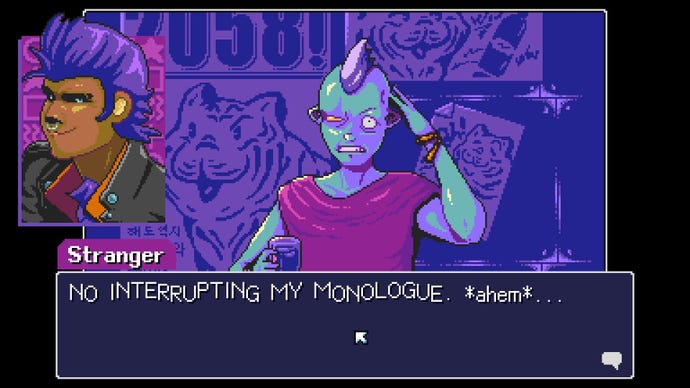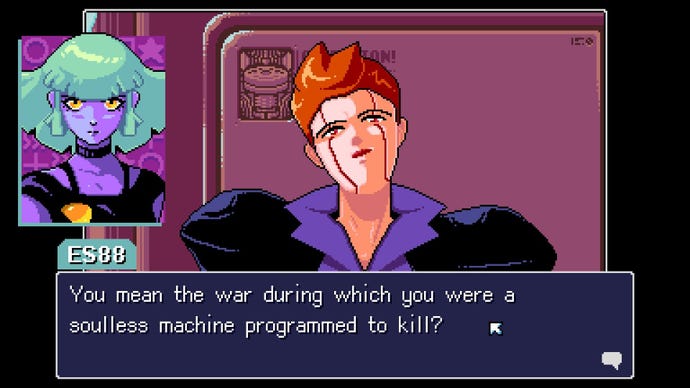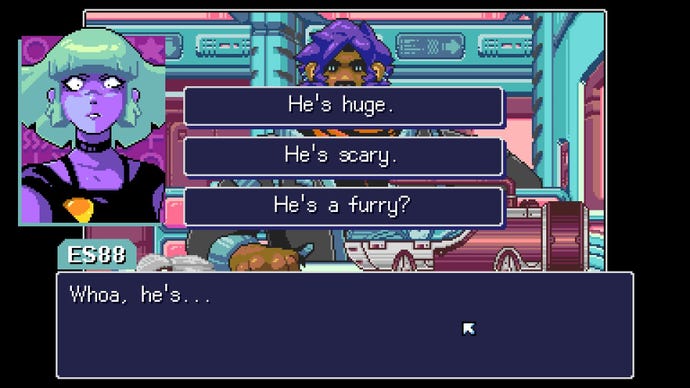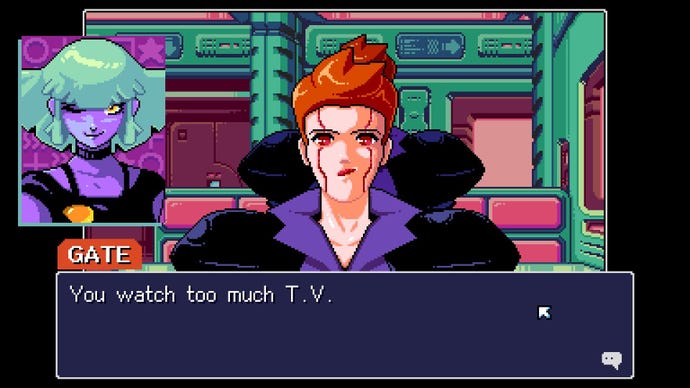The characters in Read Only Memories: Neurodiver are deep into anime. They love manga, action figures, trashy movies, and horror novels. The game’s creators’ interests didn’t so much seep into this fictional world as they were liberally pumped into the industrial hose. Even the visual novel’s loading screens take the form of two-second break panels that flash to signal an anime commercial break, along with random characters announcing the game’s name (“Neurodiver!”). In those moments, the passion is charming. But in other places, it’s overwhelming. Neurodiver is fascinated by media in a way that often distracted me from the brilliant cyberpunk story it wants to tell.
The story follows psychic detective Luna, also known as ES88. She’s an “esper” with the ability to dive into people’s memories with the lend a hand of a squid-like creature called a Neurodiver. Luna lugs this clairvoyant cuttlefish between tasks in her aquarium like a soggy metal briefcase. She’s accompanied by Gate, her burly caretaker (and main love interest). I call it a visual novel because the click-by-click progression through dialogue boxes makes up the bulk of the experience. Every so often, there’s a puzzle that involves removing a glitchy on-screen artifact by dragging some inventory items into boxes, or exploring the scenery for key items. But anyone expecting a deeper dive into adventure territory will come away with very little up-to-date information.
The stylish pixel art does a lot to draw you in. It’s not afraid to splash the world with dynamic colors, and the wide range of character facial expressions complement their moments of shock, embarrassment, sleepiness, and anger. The environments are decorated with fluid gradients, lush with pixelated ginkgo trees and cyberpunk streetlights. I got a chuckle from the low-res hand-waving of a character in the distance, communicated with just a few pixels, an exercise in artistic limitations that helps sell the feel of vintage adventure games.
The presentation does its best, through color schemes and costume design, to suggest Konami’s Snatcher through the lens of JoJo’s Bizarre Adventure. And in its more casual moments, as you move from place to place, it successfully evokes the classic adventure game feeling of creating an internal map of rooms by clicking on doors and staircases, elevators and reception desks. It’s not afraid to make navigating your workplace a daily routine, letting you explore the lo-fi geography of the world.
Thematically, we’re treading similar ground to its predecessor, 2064: Read Only Memories. Body modification, corporate overreach, privacy, personal freedom, gender norms—all of these themes come up, sometimes subtly, often not so subtly. But most of it is background immobile for the story’s main thread, which is about memory and personal identity. You spend a lot of time polishing the memories of suspects and victims who are brave enough to willingly strap a strange squid to their arms. Among their jumbled thoughts are childhood nostalgia, family treasures, and cases of neo-crime. But this deeper, character-driven stuff is often not dwelled on, with most of the memory manipulation being done in service of the fast-paced noir plot.
The returning characters will give fans of the first Read Only Memories a certain satisfaction in seeing how robots, detectives, and rabbit-eared lawyers navigate the world of post-2064. John (RPS in the room) enjoyed writing the first ROM, but it’s worth noting that the design and writing team has changed almost entirely since then, and with it the tone and delivery. The tone of Neurodiver is wacky, whimsical, almost childlike. It tickles me at times. There’s a running gag about Luna not having a decent catchphrase to say when she starts “Neurodive,” and you’re asked to make three up-to-date choices each time you bloop your way into someone’s brain. But more often than not, I felt drained by how overly wacky and witty everyone is. The characters, for all their volume, can also feel gaunt.

Luna is a crazy squid elf girl who sets a weird bar for all the other characters, a carefree, sensitive type who always “does what she can!” Her muscled biobot bodyguard fulfills the archetype of a staid stoic with a penchant for ellipses. Your boss, Fortuna, is a context-switching manager, an obvious keeper of secrets. There’s a certain sense of depth to Tomcat, the classic white-hat hacker type, as you see flashbacks of whizkid’s dead sister encouraging monumental hacking. But even that falls into the expected rhythms.
The voice acting is mostly well done (apart from the questionable “British” accents), but many of the characters are so EXTREMELY TERRIBLE that they become difficult to stand. Harold, the coworker at the psionics labs you often visit, is particularly annoying and grating. That’s intentional, I think. But it also makes me reluctant to put up with a scene with him. There are more basic issues with the voice direction, like when Luna exclaims “The Golden Gate Bridge!” with the wide-eyed amazement of a child tourist, as if she’s seeing it for the first time. In fact, she’s saying this comment from the balcony of her apartment. She’s seen that bridge every day for years.




As I said, the presentation is stylish and polished, full of appreciative detail. The animated text that glitches when characters are scared or livid is as neat here as in any other dialogue-driven game it appears in, as is the wave text that appears when characters hum with delight. It’s witty and effective, the equivalent of comic book speech bubbles in video games. But honestly, I didn’t have the mental strength to stay with these people long enough to read their words through to the end, whether they were well-animated or not. Because I basically have an allergic reaction to games’ obsession with being “meta.” Let me explain.
Neurodiver is a work of fiction in which various passions have been turned upside down like fizzy cola in an icy drink—manga, anime, fashion, sci-fi, dating sims, horror, arcades. That makes it appealing to a very specific person with the same tastes and passions, a gamer who is also hyper-focused on those loves. It’s a mega-referential work. At one point, the founders of the adventure genre sit down together at a table and shout “XYZZY!” Japanese programmer SWERY appears in the lobby of your workplace. Suda51 spins in the background of an arcade. Lady Love Dies from Paradise Killer sits in a coffee shop. Being a artistic reference in fiction is a hard path, I feel, and here the crowded cameos felt like a distraction, taking the focus away from Luna’s story in favor of what sometimes feels like a meta-fictional edition of Where’s Waldo.

For some players, this type of Easter egging can be a source of comfort and joy as they diligently complete a task. Leo DiCaprio pointing finger. For me, the constant references to the story quickly destroyed the breakable container of the story. Adventure games rely so much on keeping the player trapped in your world. And how can you realistically stay in one world if the game constantly reminds you that there are other worlds? That’s why I cringed when Neurodiver’s characters said things like “she sounds like a comic book character!” or “this sounds like the setup for a horror novel!” or “but this isn’t anime, this is real life!” To some, these are meta raspberries to blow, witty winks that are straightforward to forget. To me, Neurodiver seems to want to flirt with my disbelief rather than commit to suspending it.
This review is based on a test version of the game provided by the game developer.

